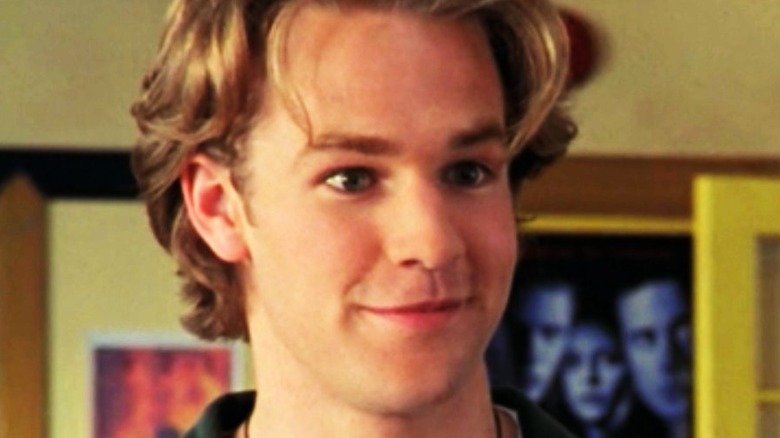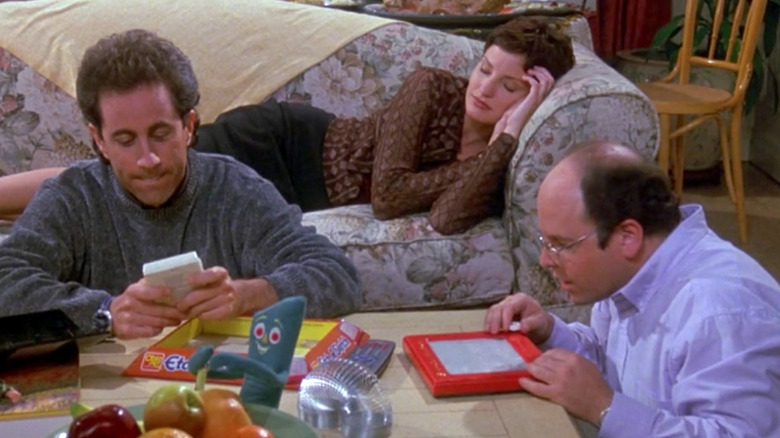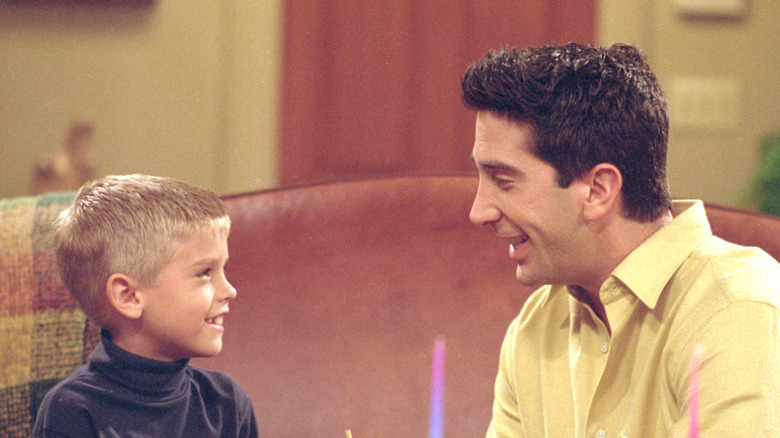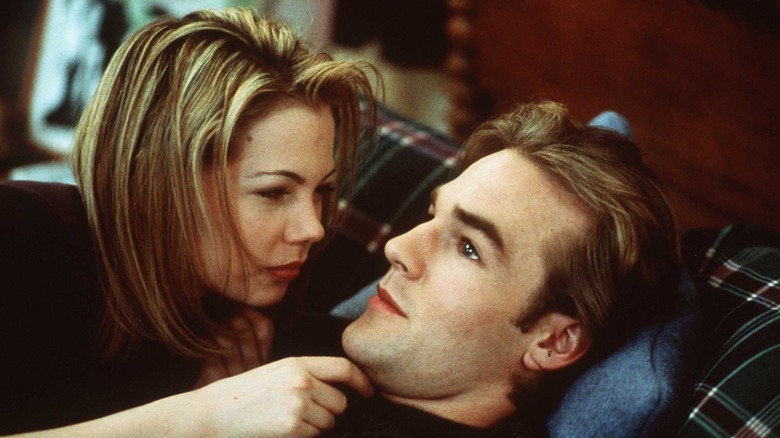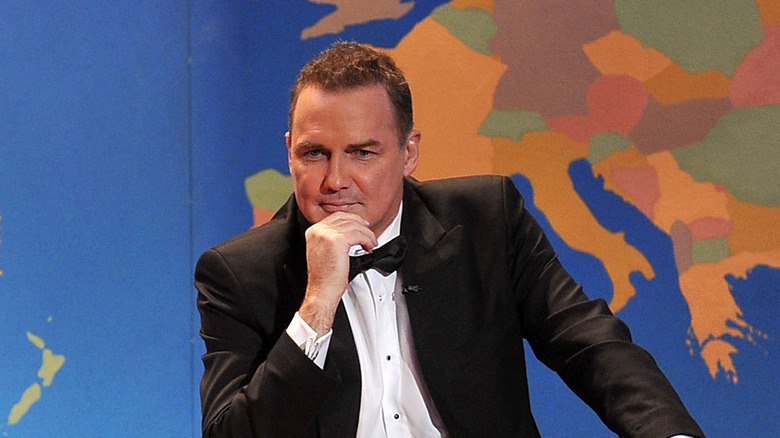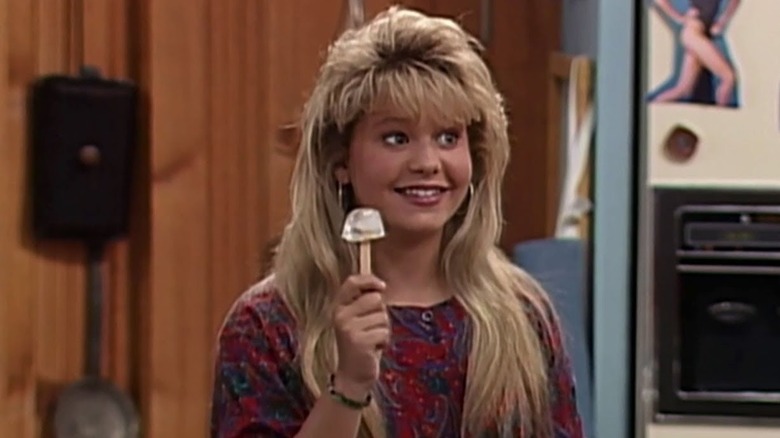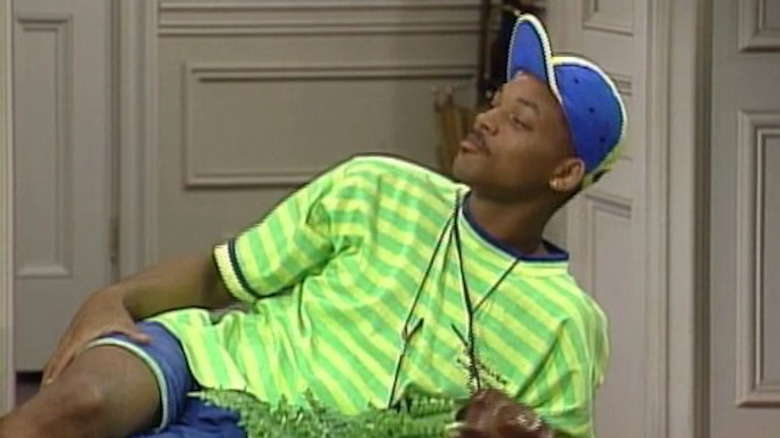Cringeworthy '90s TV Moments That Were Also Awkward At The Time
A lot of good television toes the line between providing polarizing content and simply being problematic. The best comedies tackle touchy subjects with enough empathy to elicit laughter and discourse, just as dramatic mainstays find new ways to provide social commentary without alienating marginalized groups. Before 2000, finding a show with a gentle, thoughtful approach to social commentary was rare.
Most of the time, when moments like that arise, it comes from comedians and writers reaching for low-hanging fruit and attacking vulnerable communities. It's a lazy, transgressive approach to storytelling that's growing thin, especially as streaming services continue to throw large cash heaps at sharper, groundbreaking shows and franchises. Often, the writers and performers act as if they're making thought-provoking, daring art; in reality, they're championing harmful stereotypes and putting innocent people at risk of violence and cultural ostracism.
From memorable catchphrases to mammoth finale numbers, the best television shows capture an audience's attention as well as their hearts. But on the flip side, there have been many offensive moments that were cringeworthy when they aired and have only aged poorly over time. Here's a list of the most nonredeemable cases.
Seinfeld toys with a serious subject
"Seinfeld" Season 9's sixth episode, "The Merv Griffin Show," finds one funny subplot counteracted by the distastefulness of another. When Kramer discovers the discarded set from Griffin's long-running talk show in the trash, he brings it home and turns his apartment into a temporary studio. The gags that result are good, as Kramer interviews his friends and cracks jokes. The rest of the episode, however, centers around Jerry and his girlfriend Celia (Julia Pennington), who has a priceless collection of vintage toys in her living room. Their storyline quickly takes a dark and uncomfortable turn.
When they return to her apartment after a date, Jerry drools over her Superball and original G.I. Joe action figure with the frogman suit. Celia won't let him touch the collection and asks for a pain reliever. Rather than give her a non-drowsy dose, Jerry gives her a drowsy tablet so he can play with the toys while she sleeps on the couch. George and Elaine eventually want in on it, so they treat Celia to a turkey and red wine dinner, hoping the combination of tryptophan and alcohol, coupled with a four-hour movie, will put her to bed.
The bright spot of the episode comes when Kramer is horrified by Jerry's actions, but the entire runtime is plagued by allusions to date rape and sexual assault. Shots of Celia unconscious and sprawled across her couch fell flat then and still do now. The joke is that Jerry is drugging her to take advantage of her toy collection, not her, but there's no punchline here. It's a lazy plot done in horribly bad taste that casts a shadow on a show that wasn't afraid of toeing the offensive line.
If you or anyone you know has been a victim of sexual assault, help is available. Visit the Rape, Abuse & Incest National Network website or contact RAINN's National Helpline at 1-800-656-HOPE (4673).
Friends falls prey to gender stereotypes
Homophobic and transphobic punchlines ran rampant on "Friends." For seven seasons, the entire cast threw demeaning ribs at Chandler's sexuality and his trans mom, which would culminate in a distasteful full episode in 2001. Before and after that episode, however, showrunners routinely wrote Ross as a character with a poisonous level of fragile masculinity.
Ross gets heated about gender norms here and there, channeling some serious internalized homophobia along the way, but none of those moments stack up against his rage-filled, unnecessary tirade against his son Ben's (Charles Thomas Allen and John Christopher Allen) toy preference in Season 3. "The One with the Metaphorical Tunnel" has some good laughs, but poses no real importance in the season altogether. So when Ross discovers his son playing with a Barbie doll, we have to watch him lecture Ben. It's an uncomfortable sequence, especially because Ben is so young and doesn't understand which gender or sexuality implications can supposedly stem from playing with Barbies and G.I. Joes.
Ross does what Ross is wont to do: throw a whiny fit about Ben's interests, which he believes are wrongly influenced by his mom and stepmom being lesbians. The episode does have good moments — especially when we see Chandler's relationship with Janice (Maggie Wheeler) heat up and Phoebe pose as Joey's agent — but the homophobic overtones of Ross' storyline try to imply that a boy playing with a "girl's toy" is wrong and needs correcting. It's just a toy, and Ross' fragile understanding of masculinity is a bummer subplot in an otherwise goofy, standalone chapter.
Dawson's Creek perpetuates victim-blaming
"Dawson's Creek" had a lot of dangerous, misogynistic attitudes toward women and sex throughout its six seasons, but no character suffered more than Jen. Not only does she get subjected to a lame death onscreen, Jen's motive across six seasons was, according to herself in Season 2, to "allow [Dawson] to figure out who [he] really loved." The writers tried their hardest to portray her as needy, promiscuous and one-dimensional — which opened her up to unnecessary stories like getting stranded in the ocean during a huge storm and needing to be rescued by Dawson and Joey.
But Jen's lowest moment on the show came in Season 2 when she was victim-shamed by her own family. In "Full Moon Rising," Vincent tries taking things too far with Jen, who objects to his advances. When her grandmother gets home before things can get worse, rather than offering affirmation or support, she chastises Jen for being with a boy and tells her she needs to act like a lady — questioning her own granddaughter about whether she has any self-respect. Generational dissonance aside, Jen getting humiliated like that by a loved one punctuates the show's hotbed of misconceptions about sex and rape culture, and perpetuates victim silence.
When "Dawson's Creek" arrived on Netflix, longtime fans began changing their opinions of Jen, finally seeing her as a character with poise and grace. It's a mindset they should have had 20 years ago. Though Jen's story has aged better than some others on the show, the victim-shaming scene in Season 2 was bad when it aired and endures all the same.
If you or anyone you know has been a victim of sexual assault, help is available. Visit the Rape, Abuse & Incest National Network website or contact RAINN's National Helpline at 1-800-656-HOPE (4673).
SNL hasn't apologized for Norm MacDonald's transphobia
"Weekend Update" anchor Norm Macdonald routinely found himself in hot water over his repeated jokes about the O.J. Simpson trial in 1995, but one of his worst moments on "SNL" came a year prior. During the 14th episode of the season, Macdonald chose to cover the murder trial of Brandon Teena on "Update." Teena was a 20-year-old transgender man who was raped and killed by Marvin Thomas Nissen and John Lotter in Nebraska in 1993, and when discussing the Lotter's sentencings, MacDonald proclaimed that Teena and his killers all deserved to die.
The moment sparked an immediate response from LGBTQIA+ groups across the country. A New York City direct action organization, The Transexual Menace, made flyers to hand out to "SNL" employees. The group received immediate responses from Roz Wineman, the then-head of NBC Standards and Practices, and the office of the network's president, Warren Littlefield.
However, to date, neither "SNL" nor NBC has issued an apology or retracted the joke from the episode. In a 1996 statement, Transexual Menace co-founder Riki Wilchins wrote that NBC claimed it isn't their policy to nix content from episodes — a stance that's muddled, given how they removed Martin Lawrence's controversial monologue from reruns just one year prior. After the 1994-'95 season, the show's ratings dropped to its lowest across 40 seasons and didn't see a strong uptick until 2008. The late Macdonald was removed from "Update" in 1998 and fired from "SNL" the same year, and his vile comments about Teena were again brought to light on social media as recently as 2021.
If you or a loved one has experienced a hate crime, contact the VictimConnect Hotline by phone at 1-855-4-VICTIM or by chat for more information or assistance in locating services to help. If you or a loved one are in immediate danger, call 911.
Full House glosses over eating disorders
Sitcoms tend to broach a topic for one episode and then leave it be, never to be spoken of on-air again. When 30-minute shows attempt to address mental illness, it's often done hastily — as no condition can be properly tended to in such a short time slot. "Full House" tried to give depth to their "one big, happy family" mantra in Season 4, when eldest child D.J. develops an eating disorder. In the previous season, middle child Stephanie developed PTSD after an earthquake and was "cured" within minutes of speaking to a child psychologist. The case of D.J.'s condition is approached similarly, stigmatizing serious conditions with harmful stereotypes of people being overly dramatic, uninterested in getting help and immediately curable.
D.J.'s anxious about wearing a bathing suit around her friends on Kimmy's birthday and elects to starve herself before the party. The episode does handle anorexia gently and empathetically — no character shames D.J. for her actions and they're all genuinely concerned for her — but the show's open-and-shut timeline leaves very little for viewers who've been working through the disorder for months or years in real life. D.J.'s anorexia onscreen, which boils to the point of her passing out, is hard to watch — especially since actor Candace Cameron Bure later revealed she developed an eating disorder after the show ended — but the "inspirational lecture from dad" bit at the end of the episode undercuts the progress that people with eating disorders are continuously making.
If you are struggling with an eating disorder, or know someone who is, help is available. Visit the National Eating Disorders Association website or contact NEDA's Live Helpline at 1-800-931-2237. You can also receive 24/7 Crisis Support via text (send NEDA to 741-741).
Misogyny in The Fresh Prince of Bel-Air
"The Fresh Prince of Bel-Air" is one of the most beloved sitcoms of the 1990s. The show vaulted Will Smith into blockbuster, slam-dunk star status, but it also featured a lot of cat-calling and misogyny throughout its six-season run. Will was not the ladies' man his character tried so hard to be. Instead, he often came across as a cringey, off-putting harasser. In "Ain't No Business Like Show Business," he asks one of his comic friends to act like a jerk toward a woman so he can swoop in and save the day with his chivalry.
Since "Fresh Prince" left the air, culture critics have revisited the sitcom and explored its problematic moments, onscreen and off. Smith's conflicts with co-stars created some behind-the-scenes conflict, contributing to NBC firing Janet Hubert (Aunt Viv) for having a child before Season 4 (and then calling her "difficult to work with" after the fact).
As was par for the course among borderline chauvinist male characters in pre-Y2K television, they always acted like whatever they had to say was far more important than anything said by the women they tried courting. Though "Fresh Prince" was groundbreaking in its portrayal of Black success onscreen, Will's character traits often perpetuated a manipulative imbalance of power between men and women. It was a sleazy storytelling tactic then and still leaves a bad taste in the mouths of viewers watching it today.
